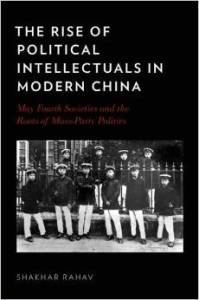The Rise of Political Intellectuals in Modern China: May Fourth Societies and the Roots of Mass-Party Politics
Posted: March 11th, 2015 | No Comments »Shakhar Rahav’s The Rise of Political Intellectuals in Modern China concentrates not on Shanghai and Peking but on Wuhan around the May 4th Movement…..
- Histories of China’s May Fourth movement have focused on the seaboard metropoles of Beijing and Shanghai. This book is the first in English to look at the movement from the hinterland city of Wuhan. It thus highlights the ways in which hinterland activism helped shape the movement.
- Rather than focusing on ideology or organization, the book explains the movement’s success in terms of social relations and social networks.
- Previous studies of the period have acknowledged the importance of myriad small societies in the political changes that presaged the Chinese Communist party. Studying the development and everyday conduct of such societies, the book illuminates what they meant for their members at the time.
- Studies of the movement have emphasized its importance for the rise of Communism. This study attempts to explain the transition from politics conducted through a web of small societies, to a politics conducted by means of mass-oriented political parties.
- May Fourth is usually taught by referring to a handful of historical personages who operated in Beijing. This book offers a narrative account that occurs in major hinterland city-Wuhan-and it circles around a unique protagonist-Yun Daiying-whose career intersected with that of well known figures who later acquired much significance, such as Mao Zedong. The book thus illuminates the period and better known activists, like Mao, from a fresh and unexpected angle.

Leave a Reply